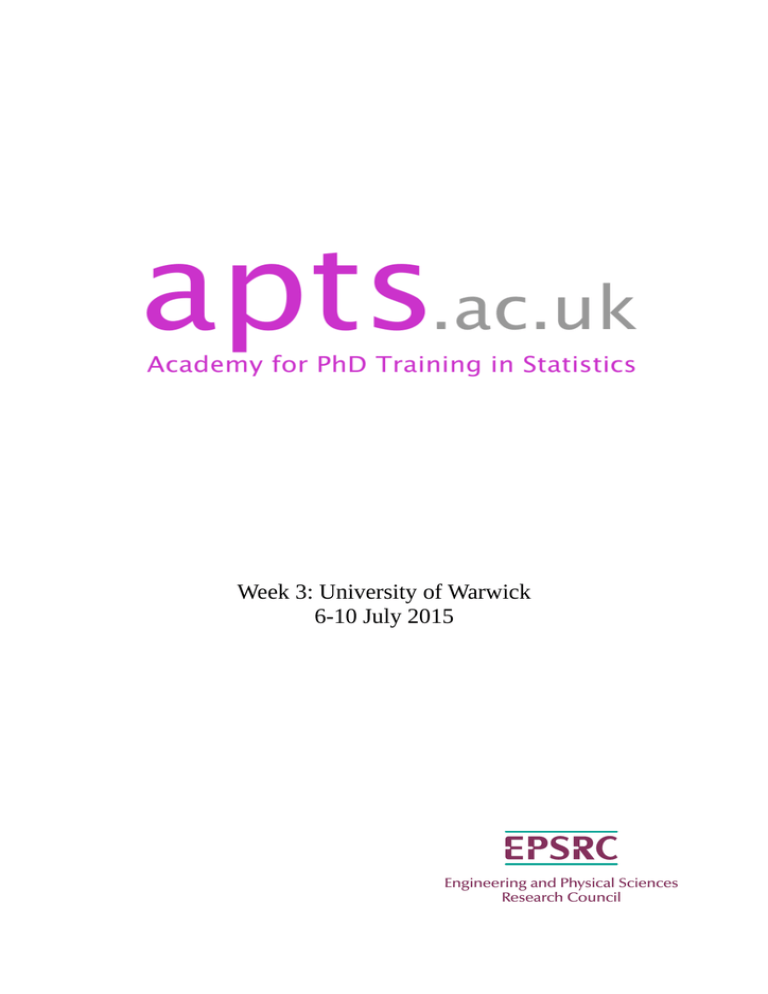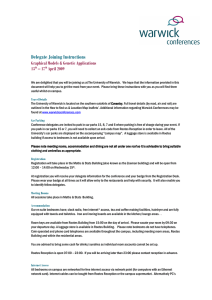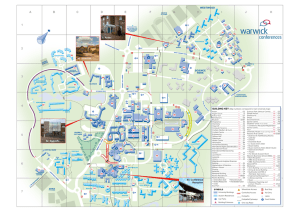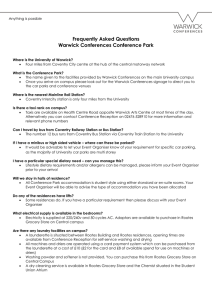Week 3: University of Warwick 6-10 July 2015
advertisement

Week 3: University of Warwick 6-10 July 2015 Welcome to Warwick! http://www2.warwick.ac.uk/fac/sci/maths/general/gethere/ Workshop registration: Registration on Monday will take place in the statistic department common room in the Maths & Statistics Building (no. 38 on the map), between 11.15 and 12.45. You will receive your badge from the registration desk. Please wear your badge at all times. This will help with security and also help you identify fellow participants. IT: Computing facilities are available from 09.00 - 18.00 in rooms A0.01 and A0.02 of the Maths & Statistics Building (by the main entrance). The login details will be supplied on the first day of the workshop. If you have a laptop that supports wireless networking, wireless access to basic Internet services is also available (Eduroam is supported across most of the Warwick campus). The Start.Warwick app, available for iPads, iPhones and Android devices from http://www2.warwick.ac.uk/services/its/servicessupport/web/mobileapps/start, provides useful information on travel and an interactive map of the campus amongst other things. Car Parking: Complimentary car parking is available for conference delegates in the allocated car parks on campus (7, 8, 8a, 9, 10 or 15). On entering the car park, take the token from the machine, which you can then validate at Conference Reception (please note that in CP8a and 8 there is no token machine but conference delegates are permitted to park in this car park without needing to pay and display). Disabled parking spaces are available close to the entrance of main buildings. Cut out and keep voucher for parking: Messages: The telephone number for colleagues or family to leave an urgent message for you during office hours is 02476 574812. For emergency messages outside these times, please call the main University Switchboard on 02476 523523. Bars: The central campus has two main bars, ``The Bar'' situated in Rootes Social Building and the Arts Centre ``Cafe Bar''. Both serve a wide selection of draught and bottled beers, spirits and soft drinks. There are also bars situated within the Students' Union. Other Campus Facilities: Facilities at the University include a pharmacy, cinema, hairdresser, newsagent, Post Office, supermarket and a launderette. In the Arts Centre, the University Bookshop is a great resource for titles of all kinds. There are Barclays and Santander banks on campus with cash dispensers. These can be found in the mall area around Rootes Social Building. All participants have full use of the extensive and well maintained 750 acre campus, with Warwickshire walks and comprehensive sports facilities including swimming, squash and tennis. Sports facilities are available to participants free of charge. Details and opening times are available at Rootes Reception. Medical and emergency information Medical Assistance: The University Health Centre is open Monday-Friday 09.00-13.00 and 14.0017.00. Visitors in need of emergency assistance should contact Security on internal extension 22222. Emergency Services and Fire Procedures: For help in an emergency dial 22222 from any internal telephone and your call will be directed appropriately. Visitors are asked to familiarize themselves with the University's fire procedures which are displayed in each bedroom. On discovering a fire in other buildings: Raise the alarm by breaking the glass in the nearest Break Glass Point. On hearing the continuous ringing of fire bells: Stop what you are doing. Leave by the nearest Fire Exit. Walk calmly, do not run. Do not stop to collect personal belongings. Make your way to the nearest evacuation point, standing well clear of the building. Do not re-enter the building until told to do so by the Fire Service or University Security Staff. Reporting Incidents: In the unlikely event of an accident or other incident occurring on University premises, please report immediately to Rootes Reception (Ext. 22280) who will then take appropriate action. Please dial 22222 from an internal phone, or 02476 522222 externally to be in direct contact with our 24 hour security staff. Accommodation information Your room: Workshop participants with accommodation have been booked into a room in Rootes (54 on the campus map). Reception: The Rootes Reception staff will be pleased to answer your queries between 07.00-23.00 at Rootes Social Building (55 on the campus map). You can contact Reception by internal phone from your hall of residence, extension *22280, or by direct line on 02476 522280 or 02476 523936. (NOTE: all internal numbers are free, but whenever using pay phones, always prefix the internal number with a star *). Checking in/out: Bedroom keys will be available from 15:00 to 23:00 at Conference Reception (within the Students Union Building; 63 on the campus map). Please vacate your bedroom by 9.30am on your day of departure. Please inform Rootes Reception on arrival of any difficulties you may have in the unlikely event of an evacuation (e.g. hearing or walking difficulties). Keys: Rootes will provide one key, which gives access both to your room and the outer door of the Residence. Keys can be left at Rootes Reception upon departure or in the boxes situated in the entrance halls of each Residence. Luggage: If you require storage for your luggage, please ask at Rootes Reception which provides a secure area for luggage storage. Internet access: All bedrooms on campus are networked for free Internet access (for computers with an ethernet network card). Do please bring your own ethernet cable if you wish to take advantage of this. Alternatively, PCs with free Internet and email access are available for both day and residential guests in Rootes Reception. These may be accessed 07.00-23.00 Monday-Sunday. Eduroam is available in many University buildings --- but at the time of writing, not in the accommodation. Meals: The lively Rootes Restaurant in the Rootes Social Building offers excellent buffet style food every day with a cooked or continental breakfast, a hot and cold buffet selection at lunch and a two course evening meal. During the APTS week, those with accommodation are booked for breakfast on Tuesday-Friday at Rootes. All participants are booked for dinner at Rootes on Monday-Wednesday evenings (and Thursday if you did not sign up for the Academy dinner). Thursday evening we will be holding an `Academy dinner' in the Chancellor's Suite (above Rootes Restaurant). There is also a bar located on the first floor of Rootes Social Building, which serves draught beers, a good selection of bottled beers, wines, spirits, soft drinks and a variety of teas and coffees. Lunches and refreshment: Vouchers will be provided for lunch. For use in: Café Bar (Arts Centre), Café Humanities, H-Van, Café Library, University House, Library Coffee Bar, Café Social, Café Westwood. Coffee breaks will take place in the Statistics department study area. APTS Timetable Monday 09:30-11:00 11:00-11:30 11:30-13:00 Registration (11:15-12:45) Tuesday Wednesday Thursday Friday Applied Stochastic Processes Applied Stochastic Processes Applied Stochastic Processes Applied Stochastic Processes Coffee (D block study area) Computer Intensive Statistics Computer Intensive Statistics Computer Intensive Statistics Computer Intensive Statistics Lunch (12:00 Statistics dept common room) 13:00-14:30 (End) Lunch Welcome (14:15-14:30) 14:30-15:30 Applied Stochastic Processes 15:30-16:00 16:00-17:15 18:30-19:30 Evening Vouchers for Café Bar (Arts Centre), Café Humanities, H-Van, Café Library, University House, Library Coffee Bar, Café Social and Café Westwood. Applied Stochastic Processes Applied Stochastic Processes (class) Applied Stochastic Processes Coffee (D block study area) Computer Intensive Statistics Computer Intensive Statistics (lab) Computer Intensive Statistics (lab) Computer Intensive Statistics (lab) Dinner (Rootes restaurant, Rootes building) Academy Dinner (Chancellor's Free evening (visit RSS reception Pub Quiz suite, Rootes Kenilworth, bus (after dinner) (Varsity Pub, building, 18:30) 11 from 20:30, map grid University Road, D3) map grid E4) Lectures, labs and classes in MS.01. A1.01 and B1.01 are available as study rooms. You are encouraged to bring your own laptop for the computer sessions. Computers available in A0.01 and A0.02 for those without access to a laptop. Computer Intensive Statistics Module leader: Dr Adam M. Johansen (Warwick) Aims: This module will introduce various computationally-intensive methods and their background theory, including material on simulation-based approaches such as Markov-chain Monte Carlo (MCMC) and the bootstrap, and on strategies for handling large datasets. The different methods will be illustrated by applications. Learning outcomes: After taking this module, students will have a working appreciation of MCMC, the bootstrap and other simulation-based methods and of their limitations, and have some experience of implementing them for simple examples. Students will also have gained an appreciation of the difficulties of handling very large datasets and of some approaches to overcoming them. Prerequisites: Preparation for this module should include a review of the following topics: • familiarity with basic types of convergence of random variables: in probability, almost sure and in distribution; • relevant basic material on statistical modelling (for which the earlier APTS module `Statistical Modelling' would be advantageous); • basic Markov chains (as for the `Applied Stochastic Processes' module); • basic knowledge of programming in a high-level language such as R will be assumed, and R will be used for case studies and exercises. Topics: • Overview of simulation-based inference; Monte Carlo testing. • Basic theory of bootstrap methods; practical considerations; limitations. • Basic theory of MCMC; types of MCMC samplers; assessment of convergence/mixing; other practical considerations; case studies. Assessment: Exercises set by the module leader, which will include some practical simulation. Applied Stochastic Processes Module leader: Dr Stephen B. Connor (York) Aims: This module will introduce students to two important notions in stochastic processes --- reversibility and martingales, --- identifying the basic ideas, outlining the main results and giving a flavour of some of the important ways in which these notions are used in statistics. Learning outcomes: Students successfully completing this module will be able to: • describe and calculate with the notion of a reversible Markov chain, both in discrete and continuous time; • describe the basic properties of discrete-parameter martingales and check whether the martingale property holds; • recall and apply significant concepts from martingale theory (indicative list: optional stopping, martingale convergence); • explain how to use Foster-Lyapunov criteria to establish recurrence and speed of convergence to equilibrium for Markov chains. Prerequisites: Preparation for this module should include a review of the basic theory and concepts of Markov chains as examples of simple stochastic processes (transition and rate matrices, irreducibility and aperiodicity, equilibrium equations and results on convergence to equilibrium), and with the definition and basic properties of the Poisson process (as an example of a simple counting process). Topics: • Reversibility of Markov chains in both discrete and continuous time, computation of equilibrium distributions, application to important examples. • Discrete time martingales, examples, application, super- and sub-martingales. • Stopping times, statements and applications of optional stopping theorem, martingale convergence theorem. • Recurrence and rates of convergence for Markov chains, application to important examples. • Statements and applications of Foster--Lyapunov criteria, viewed using the language of martingales. • Statistical applications and relevance (highlighted where appropriate). Assessment: One of the following: • Read an appropriately chosen paper (either specified or from a specified list), and identify some of the main stochastic process models and results referred to in the paper, describe their significance and use in the paper, and relate them to the material covered in the module. • Complete appropriate exercises that are simple developments or extensions of aspects of the results in the module (that may be related in some way to models and results arising in the paper).


